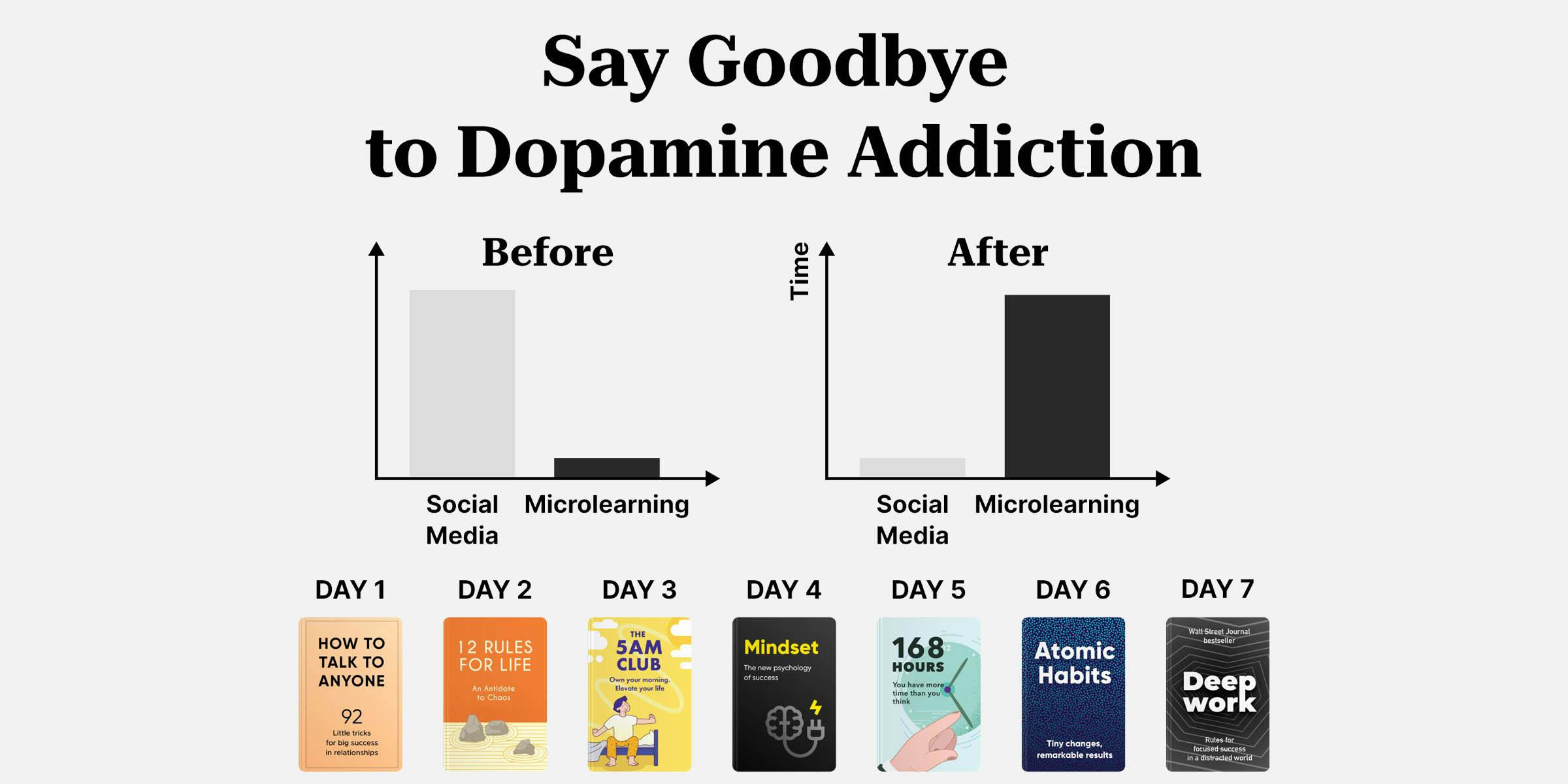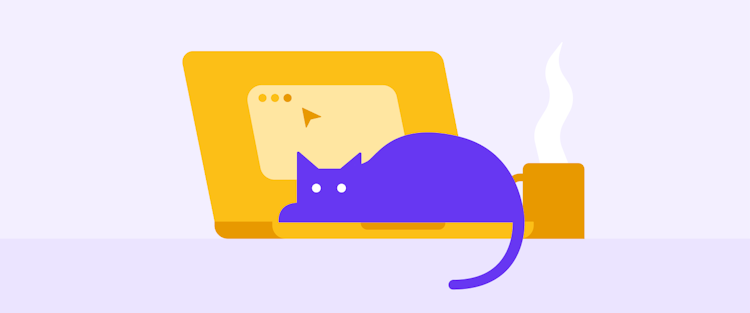Maintaining focus and concentration can be a real challenge in a world filled with distractions and instant gratification. Whether it's the constant buzz of notifications or the pull of social media, many of us find ourselves trapped in a cycle of dopamine addiction that impacts our brain's reward center, leading to addictive behaviors and making it harder to concentrate. However, there's a powerful tool available to help you break free from this cycle – the Headway app. In this article, we'll explore how you can use Headway to enhance your concentration skills and overcome dopamine addiction.
Understanding dopamine addiction and the brain's reward system
Dopamine is a neurotransmitter responsible for feelings of pleasure and reward. Modern technologies, particularly smartphones and social media, have learned to exploit the parts of the brain responsible for the dopamine system, creating a cycle where we constantly seek these fleeting surges of instant gratification. This constant flood of stimuli makes it difficult to focus on essential tasks and engage in deep, meaningful work.
Ending dopamine addiction involves understanding and addressing the various factors that fuel these addictive behaviors. High dopamine levels can come from various sources — whether it's endless video games, substance abuse, or behavioral addictions. Some people also might turn to drug abuse through addictive substances like opioids, leading to more serious issues with drug addiction. Recognizing these impacts is the first step toward addressing dopamine addiction and reclaiming control over our mental health and daily life.
The impact of dopamine addiction
When dopamine addiction takes hold, it affects both our mental health and emotional well-being. Simple actions like scrolling through social media or compulsively checking our phones trigger the release of dopamine, a neurotransmitter associated with pleasure and reward. However, when these stimuli are overused, they can lead to an overactivation of the brain's reward center, which can throw our natural dopamine levels out of balance. This imbalance can result in a range of negative consequences, including:
Increased stress and anxiety: Constantly seeking instant gratification can heighten stress and anxiety levels, making it difficult to relax and unwind.
Decreased motivation and productivity: The brain becomes accustomed to quick rewards, leading to a lack of motivation for tasks that require sustained effort.
Poor sleep quality: Excessive screen time, especially before bed, can disrupt sleep patterns and reduce overall sleep quality.
Decreased attention span: The constant barrage of notifications and updates can make it challenging to focus on a single task for an extended period.
Increased risk of depression and other mental health disorders: The imbalance in dopamine levels can contribute to the development of depression and other mental health issues.
Furthermore, dopamine addiction can strain our relationships with loved ones. Too much screen time often leads to less meaningful face-to-face interaction and can hurt our ability to connect with others. It can also affect our work or school performance, leaving us feeling less satisfied and accomplished in our daily lives.
The Headway solution
As the world's leading book summary app, Headway provides a unique approach to breaking free from dopamine addiction while building healthier habits toward learning and self-improvement. It's designed to be part of your wellness journey, helping you reduce excessive screen time while still engaging with meaningful content.
Here's how Headway helps rewire your brain for better focus:
15-minute summaries: Headway provides concise insights from bite-sized portions of the world's top nonfiction books that won't overwhelm you.
Personalization and gamification: The app uses advanced machine learning algorithms to learn your interests and goals, creating a custom learning path just for you. It includes fun challenges and rewards, such as challenges, trophies, and a brainy in-app mascot, which make learning more engaging and rewarding.
Spaced repetition: It uses proven learning techniques to ensure that users retain key insights by prompting them to revisit and reinforce said information over time. This is crucial for retaining information and combating the instant gratification mindset.
Daily insights and widgets: The platform helps to motivate you to stay on track with your self-development journey through daily insights and widgets. These story-like snippets serve as constant reminders of the importance of concentration and personal growth.
Audio summaries for on-the-go learning: The summaries are narrated by professional voice actors, allowing you to learn on the go! Now, you can listen to insights while commuting, exercising, or performing routine tasks to make every moment a productive use of your time.
Breaking the addiction cycle
If you're struggling with phone addiction and want to improve your focus, here's a simple plan using the Headway app:
Set clear goals: Choose what you want to learn and improve. The app will create a personal plan filled with challenges and collections tailored to your needs.
Consistent daily use: Spend just 15 minutes a day with Headway. This consistent daily practice will help you build healthier habits and gradually reduce your need for instant gratification.
Highlight, save, and reinforce: Use the app's features to highlight key insights, save them as flashcards, and engage in spaced repetition to reinforce your understanding of essential concepts.
Embrace challenges: Join in-app challenges and earn rewards as you grow. It makes learning feel more like a game than a chore.
The benefits of a dopamine detox
A dopamine detox is like pressing the reset button on your brain's reward system. Dr. Anna Lembke, author of "Dopamine Nation," explains that taking a break from constant stimuli can improve many health conditions. Here's what you might notice:
Your brain starts enjoying simpler things again.
You feel less stressed and anxious.
Tasks that seemed boring become easier to do.
You sleep better, especially when avoiding screens before bed.
Your attention span grows stronger.
Your relationships with loved ones improve.
Taking a break from constant stimulation helps you develop better habits. Many people find that cognitive behavioral therapy (CBT) and mindfulness practices help them stay on track. These tools teach you to understand your thoughts and behaviors better, helping you manage dopamine levels naturally.
Mindfulness and self-awareness
Mindfulness and self-awareness are essential components of a successful dopamine detox. By becoming more aware of your thoughts and behaviors, you can better manage your dopamine levels and break free from this addiction. Mindfulness practices, such as meditation and deep breathing, can help you:
Reduce stress and anxiety: Mindfulness techniques can calm the mind and reduce the stress associated with constant digital engagement.
Increase self-awareness and self-regulation: Being mindful can help you recognize your triggers and patterns, allowing you to regulate your responses more effectively.
Improve emotional regulation: Mindfulness can enhance emotional intelligence, helping you manage your emotions better.
Increase motivation and productivity: By focusing on the present moment, you can improve your concentration and productivity.
Self-awareness is also critical in identifying and challenging negative thought patterns and behaviors that contribute to dopamine addiction. By recognizing your triggers and patterns, you can develop strategies to manage them and reduce any risk of relapse.
In addition, mindfulness and self-awareness can help you develop a healthier relationship with technology. By being more mindful of your phone usage and screen time, you can build a healthier relationship with technology by:
Setting boundaries around phone usage: Establishing specific times for phone use can help limit exposure to addictive content.
Using apps that promote mindfulness and self-awareness: Certain apps are designed to encourage mindfulness and self-awareness, which can help you stay focused and present.
Engaging in activities that promote relaxation and stress reduction: Activities like yoga, reading, or spending time in nature can provide a healthy alternative to screen time.
Practicing gratitude and self-compassion: Regularly reflecting on positive aspects of life and being kind to yourself can improve overall well-being.
By incorporating mindfulness and self-awareness into daily life, you can reduce any risk of dopamine addiction and develop a healthier, more balanced relationship with technology.
Conclusion
The Headway app is a powerful ally in the battle against dopamine addiction. It offers structure and engagement without the downsides of social media's constant stimuli. By incorporating personalized learning journeys, gamification, and spaced repetition, Headway helps you regain control over your attention and well-being. Install the app today, commit to 15 minutes of daily learning, and embark on a journey of self-development that will transform your life.
FAQ
What strategies can help combat dopamine addiction and enhance well-being through dopamine detox?
Several science-backed approaches, such as mindfulness practices, CBT, and dopamine fasting, can help you reset your brain's reward system and improve your mental health. Mindfulness and CBT help individuals recognize and manage addictive behaviors, improve decision-making, and develop healthier habits. Dopamine fasting involves taking planned breaks from addictive stimuli to reset dopamine receptors and reduce dependence on the brain's reward pathways. Educational resources by experts, such as in "Dopamine Nation," explore the neuroscience of addiction and offer practical recovery strategies.
How can individuals support their journey to overcome dopamine and phone addiction?
Overcoming dopamine addiction requires a thorough plan. It involves building healthy self-care routines, having strong social support from others, and using resources that can help reduce dopamine indulgence in daily life.
Additionally, participating in wellness activities, joining support groups, and consulting healthcare professionals can help manage withdrawal symptoms and prevent relapses. It's also helpful to learn how your brain's reward system works, including relevant neurochemicals like dopamine and serotonin. You can learn more through podcasts, articles, and informative books.
Creating a supportive environment around you and using these tools can help you navigate the path to recovery and achieve long-term mental health.






